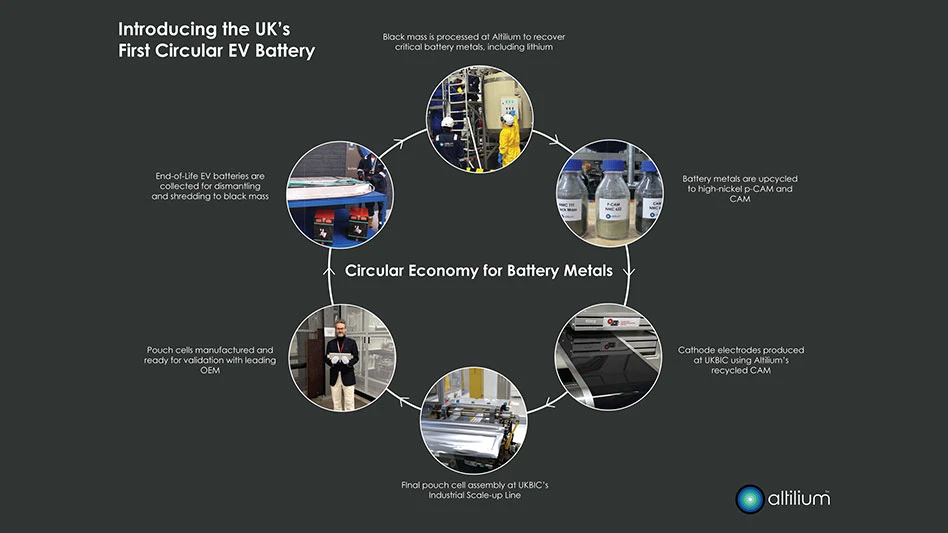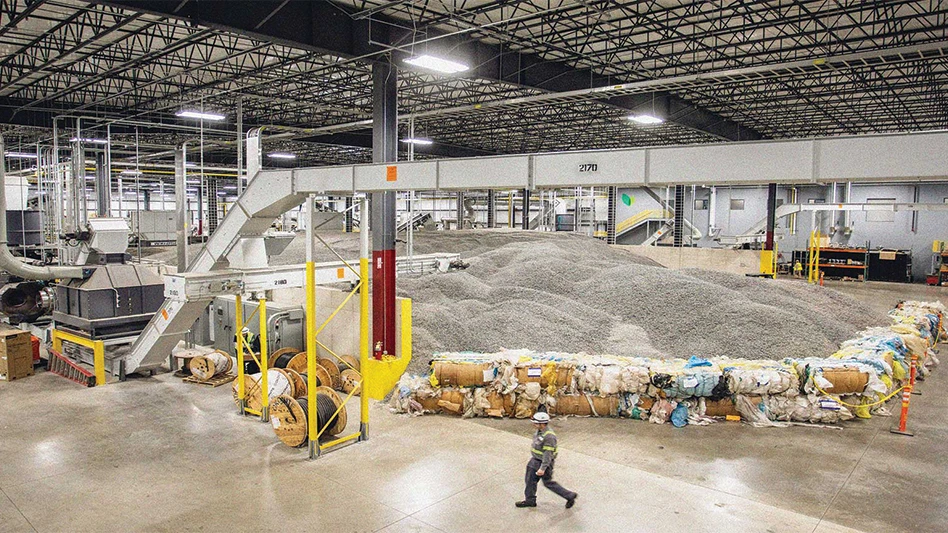Obtaining efficient backhauling services presents a number of challenges, but the cost savings are worth the effort.
Across multiple industries, transportation is one of the most significant costs of recycling. Because the transportation cost for recyclable goods tends to be high
relative to their value, recyclers must keep a keen eye out for the best rates. In moving shipments by truck, recyclers look for a backhaul rate, which is the price that a carrier would charge if the other alternative were to move an empty truck. Although backhaul rates vary, they are often half the price of forward moves, or head hauls.
For recyclers, the complexity arises in determining how to meet the service needs of their customers while obtaining backhaul rates. The way to procure the best backhaul services is to become familiar with the transport network that operates within your supply chain and to make connections.
A CHALLENGING PROCESS. Maxus Technology, an electronic scrap recycler with a facility in Morgan Hill, Calif., always looks for backhaul rates first because they are the most cost effective, David Smith, CEO, says. He says that one of the challenges is finding a truck that covers his service area. Dale Lenz, president of Streamline Logistics Inc., a truck broker based in Ames, Iowa, that serves agricultural producers, says that carrier capacity is an important issue for recyclers. "There is a capacity shortage, so it is a challenge to find the proper lanes and carriers that would perform at backhaul rates."
Lenz adds, "When the agricultural harvest occurs, it has a rippling effect on other areas. For example, if someone ships recycled paper from Orlando, truckers would switch to produce because it is more lucrative. That puts recyclers at a disadvantage."
Finding a reliable carrier is also a challenge. "A trucker may be a great carrier, but if it has space availability problems, then it does not help us. Our shipments are usually not time sensitive, but we cannot wait indefinitely," says Smith.
Steve Benacquisto, vice president of transportation at Ferrous Processing and Trading Co., Detroit, agrees. "Reliability is very important. If you have to pay for it, that is okay. I wish that we had a good clearinghouse or one number to call. It is a constant battle to find the right trucks for the right routes. Part of the challenge is the seasonal availability issue with some trucks," he says.
Smith says, "If a shipment were time sensitive, then we would not look at it as a backhaul. Backhaul is like a passenger standby on air travel. A lot of good carriers have factored it in already. Logistics is the X factor in the e-waste business. Backhauls may be 50 percent cheaper, but it depends on the size of the load and on the frequency of business. Truckers want the customer to think that every move is a forward one, but developing a relationship with the trucker helps to determine whether you are getting a backhaul rate."
Thomas Soehlke, operations manager at American Transport Group (ATG), Chicago, says there can be a lack of communication between the recycler and customer with regard to finished goods.
Peter Lobin, president of Solid Waste Solutions Corp., Chicago, says only a small percentage of recyclers make the best use of transportation. "Transportation represents between 15 percent and 45 percent of the costs for 80 percent to 90 percent of recyclers, so it should have a high priority. The key is being able to identify whether your freight is a forward or backhaul move," he notes.
SHIPMENT CRITERIA. A number of criteria determine acceptable backhaul services. "Cost effectiveness, professionalism, responsiveness and flexibility and communication with the shipper and customer are all important," Smith says. Lobin agrees that backhaul is not only about getting the cheapest rate, but also about getting quality service. "When times are bad you find out the true nature of the carrier," he says.
About 90 percent of Streamline’s recyclable shipments move at backhaul rates. "They must or it is cost prohibitive," Lenz says. "Transportation impacts overall cost effectiveness. Say that a shipper would receive X amount more selling in New York City than in Kansas, but the transportation would not make it worthwhile. You need to look at the delivered cost, which is the revenue minus the transportation costs."
FINDING BACKHAULS. Is it easier to find backhaul rates in some places in the country than in others? "Any load can be considered a backhaul or a head haul," Lenz says. "But, backhauls are generally anything shipping out of areas that consume more than they produce—wherever there is an imbalance between shippers and receivers. For example, Denver and Phoenix are backhaul points, but Chicago is not because it manufactures." He notes that many cities focus on services more than on manufacturing. If recyclers have some choice as to where they can ship, brokers can advise the best destination in order to obtain the best rate.
The West and South are a little cheaper than other parts of the country, which may be because of fewer weather-related delays, Smith says. "There are typically truckers running between major metropolitan areas, which most Maxus freight moves in or near. However, about 20 percent of our customers are in rural areas, where it is significantly more difficult to find a backhaul rate. The outlying area is hit or miss," he says.
Lenz says that it is easier to obtain backhaul rates in some industries more than in others. "Any industry in which the freight is easiest to handle, such as paper, plastics or anything baled, is cheaper for backhauls. Freight that is trucker-friendly, meaning that it is easier to load and unload, is also easier to obtain backhaul rates," he says. "Thus, it is easier to get a good rate on baled paper, which may take 15 minutes to load, than on crushed cars, which may take three hours. Cars must be strapped on, and truckers may not do it on a backhaul basis. Also difficult for backhaul rates are hazardous or waste material, such as recycled motor oil, which is out of the question for backhauls. Since the carrier has more liability, the rates would be higher," Lunz says.
Whereas recyclers look for flexibility from truckers, it works the other way as well. Having flexibility as far as the time frame makes backhauling easier, Lenz says. If you are willing to be available for loading at any time or on any day, you have a better chance of securing a backhaul rate. Lobin adds, "Getting the best rates involves providing both volume and regular shipments. A lot of it is preparation—calling brokers, calculating volume density, etc."
TRANSPORT SOLUTIONS. Smith says that dealing with truckers directly is fine if you have good contacts. Medium- and long-haul moves do use brokers, but at a certain (low) mileage point, it doesn’t make sense to have one. You can use either a broker or a transport company, but first make up your own list of 25 transport companies and contact them, Lobin says.
Says Smith, "The advantage of a broker is that they have access to many different truckers. Sometimes they consolidate shipments themselves." About 80 percent of Maxus’s shipments are booked through brokers, and 20 percent are booked directly with truckers. "We use at least two or three brokers in order to keep them honest. We don’t want the same trucker’s name to come from more than one broker," Smith says.
Another solution is to create your own two-way network. For example, Maxus ships computer monitors from the San Francisco Bay area to Canada for recycling and returns with a load of components for resale. That way Maxus can obtain the backhaul rate for the monitors. Smith says that only about 10 percent of Maxus’s moves are like this; the rest are one way.
Sponsored Content
Labor that Works
With 25 years of experience, Leadpoint delivers cost-effective workforce solutions tailored to your needs. We handle the recruiting, hiring, training, and onboarding to deliver stable, productive, and safety-focused teams. Our commitment to safety and quality ensures peace of mind with a reliable workforce that helps you achieve your goals.
"Recyclers need to stay in contact with the forward arm of their business," Lenz says. "For example, aluminum moves forward, so the scrap manager should talk to the traffic manager. Also, get to know the other companies in the area, such as the manufacturers and consumers," he suggests.
Soehlke says that recyclers should look to make partnerships through volume shipments. "Bulk orders get better pricing. If you book a bulk order in advance, you can lock in a price in advance. Only about 20 percent of recyclers give bulk orders currently. The goal is to have no dead haul, which means pulling a load that is not counterbalanced," he says. "For example, if you ship recyclable paper on skids, the product does not have a return value. But if you use Gaylord bins or totes that are returnable, instead of paying $2.00 per mile, you can pay $1.75 per mile. This does not happen often, though."
Another solution involves maintaining an in-house transportation specialist. Maxus is currently in the process of hiring a transportation manager, Smith says. "The transportation manager would establish contracts and would develop a matrix of logistics options. This will enable us to be a one-stop solution and will help to reduce logistics costs," he says.
"For certain companies, it has become a real art," Lobin says. "It is good to invest in transportation, if you are making an extra 10 percent."
Although a number of challenges exist to obtaining backhaul rates, cost savings are a definite benefit. Because transportation is such an important cost component of the overall process, recyclers should maintain a transportation specialist on staff whenever possible. Experts say that the key to successful backhauling is to know your shipping network and your truckers and to go with the best overall deal.
The author is a freelance contributor living in Washington, D.C. He can be contacted via e-mail at amcoia@lycos.com.
Get curated news on YOUR industry.
Enter your email to receive our newsletters.

Explore the May 2004 Issue
Check out more from this issue and find your next story to read.
Latest from Recycling Today
- Returpack reports increased DRS activity in Sweden
- Trade groups align against European export restrictions
- Construction, auto sectors show mixed signals
- Politics in Turkey threaten recycled steel outlet
- Toppoint Holdings expands chassis fleet
- Lego creates miniature tire recycling market
- Lux Research webinar examines chemical recycling timetables
- Plastics producer tracks pulse of wire recycling market








